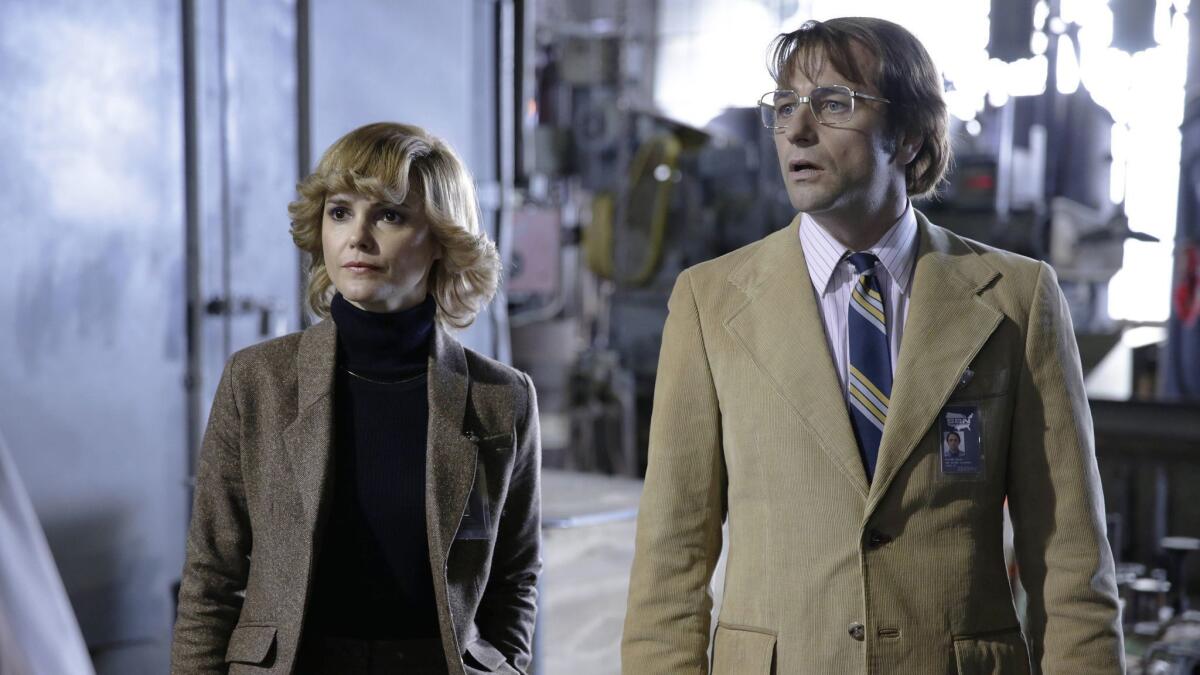‘Patrick Melrose,’ ‘The Americans’ and more turn the past into must-see escapism
Making good TV isn’t easy. Making good TV that takes place in the past or the future – that’s exponentially harder. And that’s a lesson “This Is Us” creator/showrunner Dan Fogelman, whose family drama was nominated for an Emmy award in July, says he’s learned the hard way.
“When I got into this business, I thought, ‘If I got a chance it’d be so easy to make great TV,’” he says. “But it’s so difficult and challenging – and when you add a time period not your own it’s nearly impossible. I’m amazed anyone pulls it off.”
More and more shows are pulling it off, though, because TV series set in non-contemporary periods are absolutely catnip for viewers. But what’s surprising this Emmy season is that they’ve also become addictive to voters as well: This year’s drama and limited series Emmy contenders all take place in other times (or universes) in whole or in part. It’s a little bit of trivia that may say a lot about modern audiences and members of the TV academy.

WATCH: Video Q&A’s from this season’s hottest contenders »
Part of the reason that it seems as though so many current shows fail to tell their story in the modern era may have something to do with the way shows get greenlighted.
“Sometimes they start off as contemporary pieces, but it takes so long for them to be greenlit that they become period pieces,” says “Patrick Melrose” (limited series nominee) producer Rachael Horovitz.
She also notes that as time passes after a work’s original publication (“Melrose” is based on a series of novels that first published in 1992), the story can find its place in the cultural discussion. “You can take a risk and make something happening now but, in general, commissioners don’t want to do that,” she says. “They want the hindsight of knowing something has gravitas.”
Yet it’s also hard to look at the prevalence of so much backward-looking (or forward-looking, as in the case of the “alternate now” universe of drama nominee “The Handmaid’s Tale,” as showrunner Bruce Miller explains it) storytelling and not wonder how it echoes the modern world.
“These series are visual time machines,” suggests Jakob Verbruggen, executive producer/director for limited-series nominee “The Alienist.” “They allow the audience to observe human nature and our world from a safe distance in time. At the same time, it holds a mirror to the present day. History connects us; it’s part of our collective unconscious.”
“It’s scary out there,” says Ross Duffer, co-creator/showrunner (with brother Matt Duffer) of the drama series nominee “Stranger Things.” “It wouldn’t surprise me if people are feeling more than ever that they need to escape these days.”
Yet what may start out as escapism can change over the course of a series’ run. Drama series nominee “The Americans” may have started out in 2013 as an entertaining show about Soviet spies embedded in the U.S. in the 1980s. It was comfortable at a distance – but by the time it concluded earlier this year it had a very different resonance.
“When the show began there was real value in looking back, because it allowed us to look at the idea of the enemy with some perspective of time,” say Joe Weisberg (creator/executive producer/writer) and Joel Fields (executive producer/writer) in an email. “Ironically, when ‘The Americans’ started, no one thought of the Russians as enemies. … The last thing we anticipated was that the world would change under our feet as the show unfolded.”
We like being able to smuggle in heavy topics within an innocent-looking period.
— Jakob Verbruggen, executive producer/director of “The Alienist.”
So perhaps the most-nominated period pieces aren’t really about the past (or alternate universes) at all, but how to handle the challenging now. “We like being able to smuggle in heavy topics within an innocent-looking period,” says Verbruggen. “My idea is the reason these stories are so popular now is they are addressing our consciousness now.”
Miller, who in two seasons has directly observed his show riding the political zeitgeist, says he sees stories like the ones nominated this year as galvanizing to audiences, rather than just providing a means of escape.
“A lot of these stories are about activism,” he says. “‘The Crown’ is about how a woman is disrupting the country. ‘Stranger Things’ is about a bunch of kids who don’t want to stay as kids. It’s about questions and conflicts and complicated things, and that’s what people want to see: ‘Help me figure out how to figure things out.’”
And if a show can get a would-be escapist to rise to action, even in a small way, that might be as valuable as an Emmy statuette. Says Verbruggen, “If we can raise a few questions, even subconsciously with the audience, that would be the biggest compliment of all.”
More to Read
From the Oscars to the Emmys.
Get the Envelope newsletter for exclusive awards season coverage, behind-the-scenes stories from the Envelope podcast and columnist Glenn Whipp’s must-read analysis.
You may occasionally receive promotional content from the Los Angeles Times.






